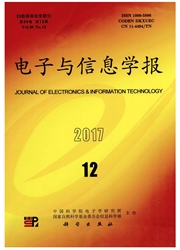

 中文摘要:
中文摘要:
针对多载波系统中信道矩阵QR(正交三角矩阵)分解的延时问题,该文提出适用于MIMO—OFDM系统QR分解的分布式脉动阵列处理(DistributedSystolicArrayProcessing,DSAP)算法。该算法包含两种处理机制,一是交织预处理,对不同子载波信道矩阵行矢量进行分组交织处理,按照延时递增规律将每列信道矩阵元素读出并输入到脉动阵列;二是分布式脉动阵列计算,通过脉动阵列边界单元和内部单元中流水线CORDIC计算和子载波同步处理实现信道矩阵QR分解分布式处理,实现不同子载波QR分解分布于脉动阵列边界单元和内部单元中CORDIC不同级。与串行脉动阵列处理(seri出SystolicArrayProcessing,SSAP)算法比,DSAP算法充分利用时钟周期,分解延时约为SSAP算法的8%,有效减少数据处理延时,而复杂度几乎没有增加。
 英文摘要:
英文摘要:
To reduce the delay of Quadrature tRiangle (QR)-decomposition in the multi-carrier systems, a Distributed Systolic Array Processing (DSAP) algorithm for MIMO-OFDM system is proposed. The algorithm includes two processing mechanism: the first is the interleaved pre-processing, which groups and interleaves the row vectors of different channel matrix, and then the matrix elements are sent into the systolic array in columns according to the delay increasing pattern; the other is the signal processing of the distributed systolic array, which uses the CORDIC computation in the boundary and internal cells of systolic array and the synchronization operation, can distribute the QR-decomposition of different sub-carriers into the different stages of the pipelining operation of CORDIC in systolic array. Compared to Serial Systolic Array Processing (SSAP) algorithm, the clock periods can be put to great use in the DSAP algorithm, the delay is reduced by ninety-two percent with the same complexity, and it reduces the delay of subsequent data processing effectively.
 同期刊论文项目
同期刊论文项目
 同项目期刊论文
同项目期刊论文
 期刊信息
期刊信息
